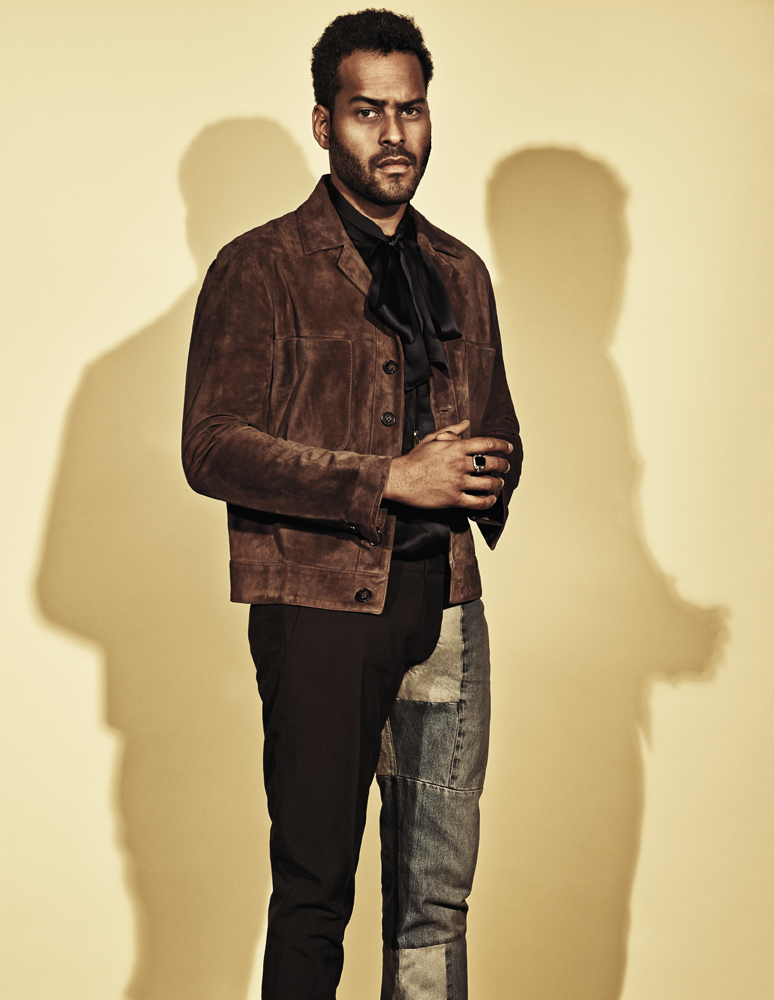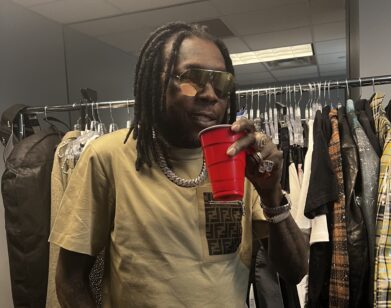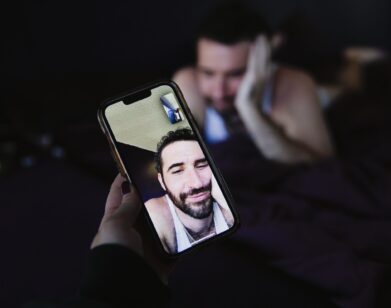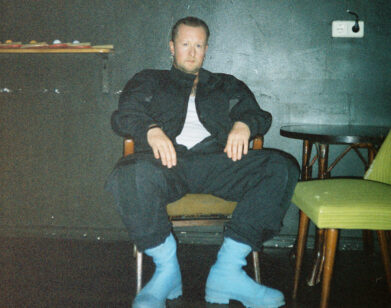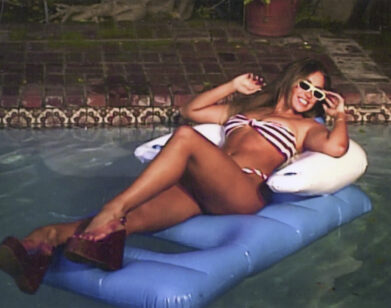Twin Shadow
I usually end up playing everything myself because I’m very particular about what goes down. I feel like it adds character. George Lewis Jr.
It’s usually the case that the longer you do your job the easier it gets. Not in the world of pop music. Figuring out new ways to expand the lexicon of what a song can do, while also not repeating yourself, is not a simple task to master. For George Lewis Jr.—the artist better known as Twin Shadow—the making of his new album involved moving out west and becoming a car tinkerer before ultimately setting up shop in a cemetery full of Hollywood ghosts to construct the dramatic and emphatic Eclipse.
Twin Shadow’s songs have thrived on a kind of private drama—soulful, R&B-inflected synthpop narratives in which Lewis doesn’t always play the good guy. On Eclipse, the outré pop leanings of his previous albums (2010’s Forget and 2012’s Confess) have grown to stadium size. The production is slicker, the hooks are tighter (and impossible to get out of your head), and the whole affair is imbued with an optimism in marked contrast with the jaded stance of his earlier work.
The sonic leap documented on Eclipse is the result of big changes for the 32-year-old Lewis, who not only left his longtime digs in Brooklyn for Los Angeles three years ago, but also made the leap from venerable indie label 4AD to Warner Bros. For anyone paying close attention, the move to a major label should come as no surprise. Lewis’s creative ambitions began coming into focus on Confess, an album whose thorny bravado seemed out of step with the lo-fi humility prevalent among his chillwave peers. Lewis appeared hungry to speak to a larger audience, a desire writ large on Eclipse. Nowhere is this more evident than on “I’m Ready,” a song that finds Lewis “at the top of a hill looking down at L.A.” and dreaming about what should happen next. “I’m right here, I’m ready / I need this love,” he sings, in what might be the record’s distilled message. Only half a decade into his career as Twin Shadow, Lewis is ready to make the leap from being the next big thing to the thing itself: a pop star.
T. COLE RACHEL: After touring so much for your last album, did you give yourself a grace period to just chill for a while and not stress out about the next thing?
GEORGE LEWIS: I did, but I think my inner ambition kind of messed with me having a break. I started becoming concerned with it immediately and I wasn’t actively making any new music yet, so it was stressful. But there was this really nice block of time where I purchased an old car and had set up a garage at this house that I was staying at. I spent a good two weeks not thinking about music at all. I remember cooking a lot. I had little parties and just spent tons of time working on my car.
RACHEL: What is the car?
LEWIS: It’s an old 1978 Datsun 280Z. The best downtime that I had involved doing things like changing the alternator in my car. It’s weird that I have this romantic vision of that time. [laughs] I remember I bought a mechanic’s onesie and just lived in it for two weeks. And it was so nice to just not think about my career for a little while. I had to try to get some peace in my life, I guess.
RACHEL: You have to recharge your batteries in some way. I think when you don’t, the work suffers.
LEWIS: Everything suffers. It’s true. It’s unfortunate that during that time I couldn’t quite figure out how to mend other things in my life, but I really needed to kind of gain a bit of sanity. And it helped.
RACHEL: I love the fact that Eclipse was recorded in part at the Hollywood Forever Cemetery. Was it hard to convince them to let you work there?
LEWIS: No. It was a conversation that I had with my manager, where I said, “Wouldn’t it be crazy if I could record this record in a cemetery? It would be so perfect because I could have 24-hour access, it would be quiet all the time, and I would never upset anyone … other than the dead, I guess.” My manager called expecting they’d say no, but the guy who runs the cemetery called us back and said, “Yeah, come down. We’ll go look at spaces.” And he actually gave me options. There were mausoleums, the chapel … It’s one of those things that if you don’t ask, you’ll never know.
RACHEL: So you recorded in the chapel space, then?
LEWIS: Yeah. In this building near where they have all these peacock cages, which is the most bizarre thing—being there at night and hearing the peacocks.
RACHEL: Do they corral them all? Peacocks seem fairly unmanageable.
LEWIS: Yeah, they have workers who let them out and they walk the grounds. And at night they corral them all and they go into these cages.
RACHEL: Peacocks make crazy sounds.
LEWIS: They make the craziest sounds. Once it’s really late, I guess they go to sleep, and they are very quiet. But just as night is falling, it’s just a frightening sound. Sounds just like a scream.
RACHEL: Was it hard to retrofit the space to work in?
In the past I have been guilty of making something clever, or just trying to write the ‘perfect’ song, And I’m not interested in making art like that. I just want it to be a realistic mirror of my emotional environment. George Lewis Jr
LEWIS: No, because it was kind of perfect. The two main doors open up to this huge, empty chapel. There’s nothing in there—no pews, maybe just a table. It was actually a little bit too reverberant, so I had someone come in and lay down carpet in that space. In the back—which is like the priest’s quarters—the space was just, like, the perfect control room. It was very small, very cozy. I had a little couch and then this fireplace, which always freaked me out because of the way it was set up; my feet were always inside of the fireplace. I was always waiting for something crazy to come out.
RACHEL: For a demonic flame to burst out and speak to you?
LEWIS: Yeah, exactly.
RACHEL: Did anything weird ever happen?
LEWIS: Yeah. When my keyboard player [Wynne Bennett] started coming to the space, she would ride her bike. So she rode her bike into the cemetery at night, and one night she comes running in the space, saying, “There’s someone out there!” And I’m like, “No, there’s not.” And she’s like, “I swear I saw someone! Standing next to this gravestone!” And we’re all like, “Well, maybe it’s someone who’s in the cemetery late or something?” And I went out and I didn’t find anything. The next day my friend sent me a photo that she had taken in the cemetery with a disposable camera. When she got it developed, there is this crazy … Well, it looks like somebody is standing next to this gravestone. And I showed it to my keyboard player, and she’s like, “That was him!” I still don’t even know if I believe it.
RACHEL: I mean, there are all these iconic performers buried there … Maybe it’s one of their spirits giving you their creative blessing.
LEWIS: Yeah, like Johnny Ramone. Also there’s a memorial to the dog from The Wizard of Oz there.
RACHEL: Oh yeah. [laughs] Maybe it was Toto. I know you tend to do almost everything yourself when it comes to making records. Has your way of working evolved or changed radically over the years?
LEWIS: Yes, actually. Collaboration was a big part of this record. And it’s interesting because I say that, and then I check myself because a lot of what ended up on the record was me playing all by myself. Still, there were tons of collaborations that didn’t make the record, and those collaborations really shaped the way I thought about the songs that did end up on the record. I feel like this record is the first one where I actually wanted people around to be sounding boards. Dennis Herring—I ended up finishing the record at his studio—he would just come in and listen. He would be like, “I don’t feel like what you’re saying is sincere right there.” And sometimes I’d take the advice. Sometimes I wouldn’t. But there was a lot of that. Letting my keyboard player have her opinion. You know, letting a lot of people get in there and listen instead of being so private about it. I usually end up playing everything myself because I’m very particular about what goes down. It’s still very important for me to play bass. Even piano. Things that are actually way too hard for me I still play myself. I feel like it adds character. Every layer I do myself I feel like … then the record feels more like me. That’s something I’ve always been in love with—playing something that I don’t know how to play. Challenging myself in that way has been the centerpiece of a lot of my music.
RACHEL: The album is a document that exists forever in this fixed form that you can’t really go back and change. It’s nice that even if some of it isn’t as perfect as it technically could be, that it’s actually you playing.
LEWIS: Yeah. There’s so much technology that helps you make things perfect. And certainly when perfect is needed, I love using those tools. But it’s also very easy to lose yourself inside of it. Letting the computer do something for you, or letting someone who’s better than you do something for you, it’s a slippery slope. It’s dangerous.
RACHEL: Or just producing things to the point of them becoming inhuman. I think that’s the most dangerous thing for a lot of bands. Production becomes like plastic surgery in L.A. Everyone starts to have the same face.
LEWIS: Totally. Yeah, it’s amazing to me how restraint is such a virtue. Putting your signature on something is important, or even just letting things be kind of cruddy can be cool.
RACHEL: I can see both sides of it. I can understand people who want to make an album that is, like, this perfect document—the songs in their most perfect form—but when you become too obsessed with that idea and too precious about the whole thing, it can suck the soul right out of it.
LEWIS: It certainly can. You listen to Steely Dan records. You have all these really strange guys making perfect music that is an amalgamation of a lot of different things. Even though it’s a little too perfect—like annoyingly perfect—it still comes out as classic. And it still comes out as—I don’t know if soulful is the word I would attach—but it’s effective. And I think that there’s a time and a place to do that, and I think that’s a maturity thing. There comes a point where that becomes a challenge. And then that’s good. But when it becomes a thing to do because everyone is gonna like it, or a thing to do because it’s the way it’s supposed to be done, it can be a disaster.
RACHEL: Does this record feel more naked to you in some ways? More personal than your previous ones?
LEWIS: Yeah, I think it’s more direct and it’s simpler. I’m trying not to use as many words to communicate feelings. On this record, I didn’t write my feelings down a lot. I just had them in my head and sang them. That’s not true for all the songs, but that’s true for a lot of them. I didn’t want it to be too clever. In the past I have been guilty of making something clever, or just trying to write the “perfect” song, and I’m not interested in making art like that. I just want it to be a realistic mirror of my emotional environment.
RACHEL: I think sometimes sincerity and earnestness get a bad rap. If done the wrong way, sincerity can be terrible, but done right, I think it’s refreshing. Cleverness gets really old.
LEWIS: There are so many layers to it. There’s a goofier side to clever and then there’s the really “cool” side of clever. I think subtlety is so cool. Life itself is kind of more subtle than you would think. It has its extremes, but a lot of life can be really simple and mundane. Out in the world, there are all these crazy things happening. Things are just burning to the ground. There is real drama. So I just want my art to reflect the heightened state of humanity. I want to smash my head against the wall sometimes, you know? And I want that to be reflected. That’s never about being cool or clever; that’s crying out. And I wouldn’t even say my work is incredibly earnest. I think it’s just … impulsive. It’s just not thinking about things too much.
RACHEL: Yeah, there’s a real sense of openness to this record, which reads as a kind of optimism that your earlier records didn’t always have. Here, you are sort of shouting out these big feelings in a very honest way.
LEWIS: Well, I didn’t set out to do anything in particular. When I look back, I see this record as kind of an opposite to the last record, which was kind of like fire and brimstone. I feel like I was trying to hurt everyone back with that record. I realized how damaging all of that was, and that even though that was a very honest moment in my life, it didn’t lead me to where I wanted to be. It didn’t put me around the people I wanted to be around. This time I wanted to just generate this much more open kind of feeling. It’s a much more positive vibe.
T. COLE RACHEL IS A BROOKLYN-BASED WRITER AND FELINE ENTHUSIAST.

